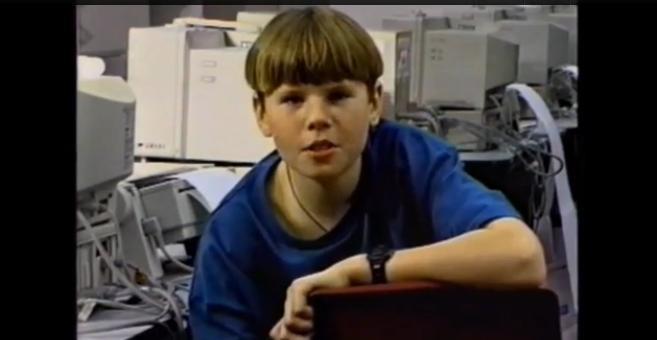What’s better than imagining how new technologies will change society? Looking at how we did it in the ’90s!
This 1995 PSA by fifth-graders in Helena, Mont., made its way around the Internet this week, reminding all of us how different life was less than 20 years ago. These students make a convincing case for logging on by talking about all the great things the networked world would bring us in about 10 years’ time. Their prescient predictions include foreseeing that the Internet would take on the roles of our phones, televisions, offices, and retail stores.
Those might seem like safe guesses today, but remember how Internet looked—and sounded—back then. When you couldn’t even send an email and make a phone call at the same time, it was a big leap to expect that we’d someday gather around our computers to watch Home Improvement. (I do wish someone had warned us about buffering.) Luckily, these kids imagined a more perfect Feline Information Page, and kept us hopeful that the Internet would change everything. And they weren’t the only ones talking about this promising future in now-hilarious ways.
Let’s journey down the “information superhighway” and check out three other videos that teach us about the Internet in 1995.
“Discovering the World Wide Web”
So how did we talk about the Internet in 1995? Very, very slowly. This user’s guide spends half an hour walking viewers through many things that kindergarteners can do today, like identifying hyperlinks or using a browser’s back and forward buttons. Also notable is the fact that everyone emphasized the difference between the Internet and the World Wide Web. (Now that the Web is dead, who cares, right?)
Don’t worry about watching the whole thing. Just a few minutes will give you a good look at how we expected the Internet to change our lives. The main point is how an interconnected world would change how we learn and do research, and those pesky old library books really take a beating. There’s one early cautionary tale at 5:51, though: “You’ll quickly discover the power and the problem with the World Wide Web. It’s so easy to find information that’s so cool to look at and hear that you’ll probably lose all track of time and what you came online to search for in the first place.” #CorgiCam, anyone?
The Incredible Browser
In this clip , the host says what everyone needed to hear in 1995: “The Internet is not just some pie-in-the-sky kind of thing.” IBM’s David Barnes made a name for himself getting people excited about the OS/2, the first operating system with a built-in browser. Most people didn’t really know why that mattered, but Barnes put its influence in no uncertain terms. “If a small business is not looking at the Internet, they better, because their competition is,” he says.
Barnes predicted the coming wave of e-commerce, though it was perhaps too early to realize the fact that collecting data from shoppers would become one of the most valuable marketing tools of the online age. Oh, and how great is his enthusiasm for loading more than one site at a time? Count up how many tabs you have open right now and be thankful we’ve found a better way to multitask.
How the Internet Is Like a Cordless Phone
Discussions about the Internet in 1995 involved a deeper understanding of how it actually operated. It’s safe to say most people today have a vague idea of how the Internet works (it’s a series of tubes, right?), and we don’t want reporters explaining the Internet every time they bring it up. But in the early days of logging on, specifics were everywhere.
Robert Hoff of the Antioch, Calif., library explained that the Internet works by letting a user “log on to a remote computer… to use that computer’s resources.” Today, this explanation of a network is so familiar that it sounds silly to describe the Internet as a tool that lets us sit in front of a faraway computer without leaving our own desk. Of course that’s not the only silly thing here—in a golden example of technological dissonance, the Internet Yellow Pages makes a cameo appearance as a helpful guide to navigating the World Wide Web. How’s that for keeping up with the ’90s?
